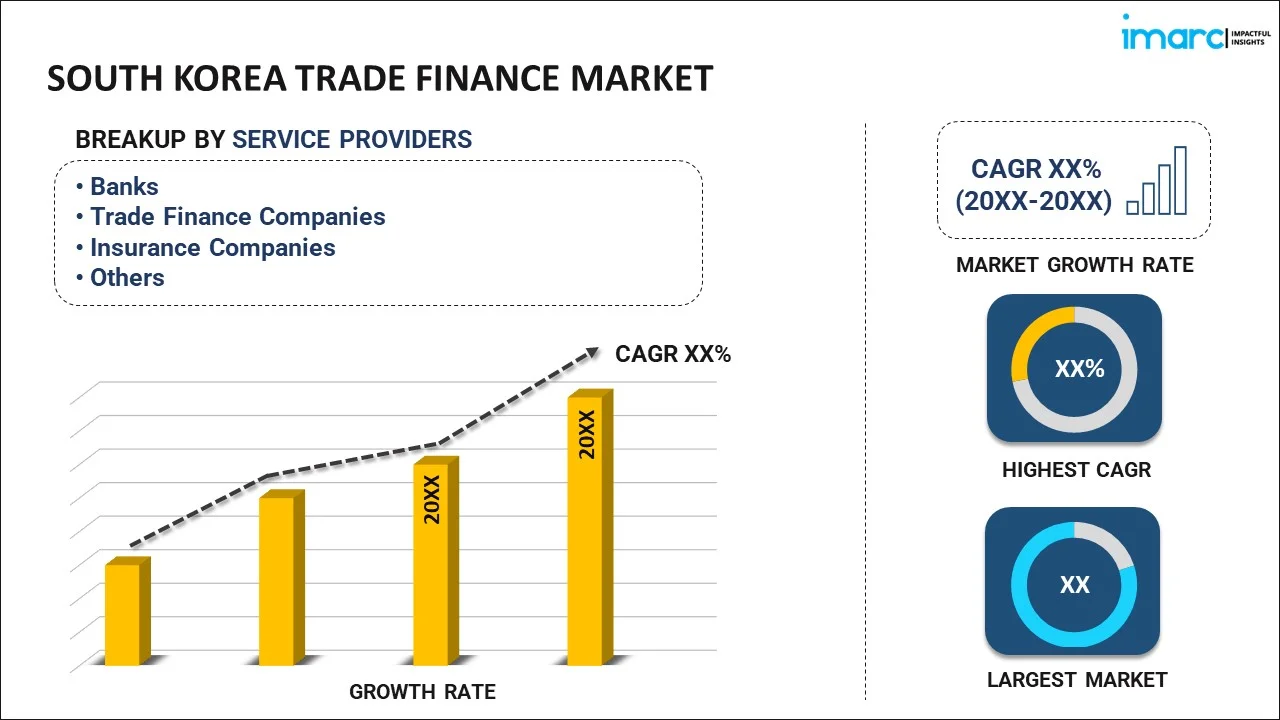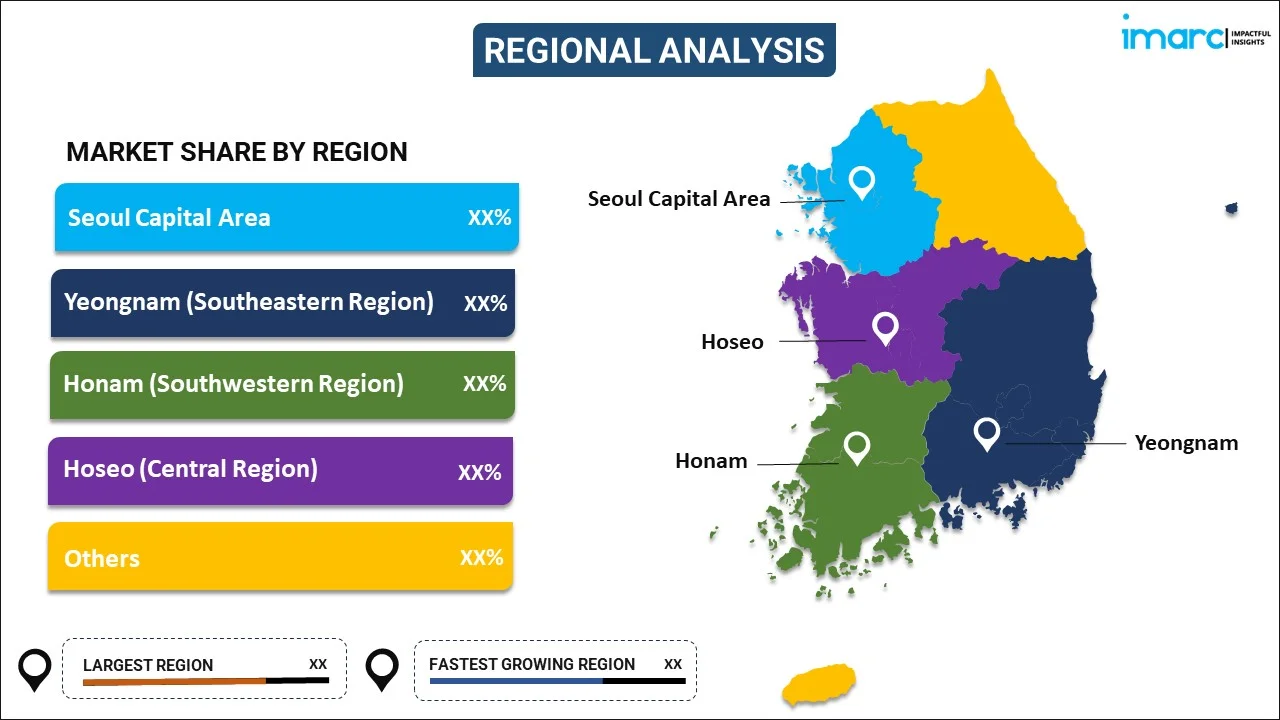
South Korea Trade Finance Market Report by Service Provider (Banks, Trade Finance Companies, Insurance Companies, and Others), Application (Domestic, International), and Region 2026-2034
Market Overview:
South Korea trade finance market size reached USD 1.1 Billion in 2025. Looking forward, IMARC Group expects the market to reach USD 1.8 Billion by 2034, exhibiting a growth rate (CAGR) of 5.63% during 2026-2034. The integration of blockchain technology in the finance sector, the rise of e-commerce platforms and catalyzing cross-border trade, and the government initiatives to promote exports and enhance the competitiveness of local businesses represent some of the key factors driving the market.
|
Report Attribute
|
Key Statistics
|
|---|---|
|
Base Year
|
2025 |
|
Forecast Years
|
2026-2034 |
|
Historical Years
|
2020-2025
|
| Market Size in 2025 | USD 1.1 Billion |
| Market Forecast in 2034 | USD 1.8 Billion |
| Market Growth Rate (2026-2034) | 5.63% |
Access the full market insights report Request Sample
Trade finance is a specialized financial field that involves a range of financial instruments and services designed to facilitate international trade transactions. It plays a crucial role in ensuring the smooth flow of goods and services between buyers and sellers in different countries. Trade finance serves as a financial lubricant, addressing the unique challenges and risks associated with cross-border trade. It also includes trade credit facilities and working capital loans tailored to the specific needs of businesses engaged in cross-border trade. These loans can help cover various expenses related to international transactions, such as shipping costs, customs duties, and inventory financing. Besides, trade finance also offers risk mitigation solutions. This includes tools and services to manage risks associated with currency fluctuations, political instability, and other factors that can impact international trade. Forward contracts, currency swaps, and political risk insurance are examples of risk management tools in trade finance. They provide confidence to both buyers and sellers by reducing the risks associated with international trade, ensuring that goods and payments are exchanged securely and efficiently.
South Korea Trade Finance Market Trends:
South Korea is at the forefront of adopting cutting-edge technologies in trade finance. The integration of blockchain technology has brought about unprecedented levels of transparency, security, and efficiency in trade-related transactions. Smart contracts, powered by blockchain, are automating many aspects of trade finance, reducing administrative overhead, and minimizing the risk of fraud. In addition, South Korea has been actively engaged in forming economic partnerships with countries around the world. Bilateral and multilateral trade agreements, such as the Korea-US Free Trade Agreement (KORUS), have significantly expanded market access for South Korean businesses. These agreements boost exports and stimulate demand for trade finance services. Besides, the rise of e-commerce platforms has catalyzed cross-border trade. South Korean businesses, particularly in the technology and consumer goods sectors, are capitalizing on the global demand for their products. Trade finance providers are adapting to the needs of online sellers, offering solutions for payment processing, order fulfillment, and currency exchange. Moreover, managing risks associated with international trade is a top priority for businesses. South Korea's trade finance sector is witnessing a surge in demand for trade credit insurance and risk management solutions. This trend is driven by the unpredictable nature of global markets and the need to safeguard against payment defaults and political risks. Furthermore, the government initiatives to promote exports and enhance the competitiveness of local businesses are driving the trade finance market. Export credit agencies and trade promotion organizations are working in tandem with financial institutions to provide a conducive environment for trade growth.
South Korea Trade Finance Market Segmentation:
IMARC Group provides an analysis of the key trends in each segment of the market, along with forecasts at the country level for 2026-2034. Our report has categorized the market based on service provider and application.
Service Provider Insights:

To get detailed segment analysis of this market Request Sample
- Banks
- Trade Finance Companies
- Insurance Companies
- Others
The report has provided a detailed breakup and analysis of the market based on the service provider. This includes banks, trade finance companies, insurance companies, and others.
Application Insights:
- Domestic
- International
A detailed breakup and analysis of the market based on the application have also been provided in the report. This includes domestic and international.
Regional Insights:

To get detailed regional analysis of this market Request Sample
- Seoul Capital Area
- Yeongnam (Southeastern Region)
- Honam (Southwestern Region)
- Hoseo (Central Region)
- Others
The report has also provided a comprehensive analysis of all the major regional markets, which include Seoul Capital Area, Yeongnam (Southeastern Region), Honam (Southwestern Region), Hoseo (Central Region), and Others.
Competitive Landscape:
The market research report has also provided a comprehensive analysis of the competitive landscape in the market. Competitive analysis such as market structure, key player positioning, top winning strategies, competitive dashboard, and company evaluation quadrant has been covered in the report. Also, detailed profiles of all major companies have been provided.
South Korea Trade Finance Market Report Coverage:
| Report Features | Details |
|---|---|
| Base Year of the Analysis | 2025 |
| Historical Period | 2020-2025 |
| Forecast Period | 2026-2034 |
| Units | Billion USD |
| Scope of the Report | Exploration of Historical and Forecast Trends, Industry Catalysts and Challenges, Segment-Wise Historical and Predictive Market Assessment:
|
| Service Providers Covered | Banks, Trade Finance Companies, Insurance Companies, Others |
| Applications Covered | Domestic, International |
| Regions Covered | Seoul Capital Area, Yeongnam (Southeastern Region), Honam (Southwestern Region), Hoseo (Central Region), Others |
| Customization Scope | 10% Free Customization |
| Post-Sale Analyst Support | 10-12 Weeks |
| Delivery Format | PDF and Excel through Email (We can also provide the editable version of the report in PPT/Word format on special request) |
Key Questions Answered in This Report:
- How has the South Korea trade finance market performed so far and how will it perform in the coming years?
- What has been the impact of COVID-19 on the South Korea trade finance market?
- What is the breakup of the South Korea trade finance market on the basis of service provider?
- What is the breakup of the South Korea trade finance market on the basis of application?
- What are the various stages in the value chain of the South Korea trade finance market?
- What are the key driving factors and challenges in the South Korea trade finance?
- What is the structure of the South Korea trade finance market and who are the key players?
- What is the degree of competition in the South Korea trade finance market?
Key Benefits for Stakeholders:
- IMARC’s industry report offers a comprehensive quantitative analysis of various market segments, historical and current market trends, market forecasts, and dynamics of the South Korea trade finance market from 2020-2034.
- The research report provides the latest information on the market drivers, challenges, and opportunities in the South Korea trade finance market.
- Porter's five forces analysis assist stakeholders in assessing the impact of new entrants, competitive rivalry, supplier power, buyer power, and the threat of substitution. It helps stakeholders to analyze the level of competition within the South Korea trade finance industry and its attractiveness.
- Competitive landscape allows stakeholders to understand their competitive environment and provides an insight into the current positions of key players in the market.
Need more help?
- Speak to our experienced analysts for insights on the current market scenarios.
- Include additional segments and countries to customize the report as per your requirement.
- Gain an unparalleled competitive advantage in your domain by understanding how to utilize the report and positively impacting your operations and revenue.
- For further assistance, please connect with our analysts.
 Request Customization
Request Customization
 Speak to an Analyst
Speak to an Analyst
 Request Brochure
Request Brochure
 Inquire Before Buying
Inquire Before Buying




.webp)




.webp)












